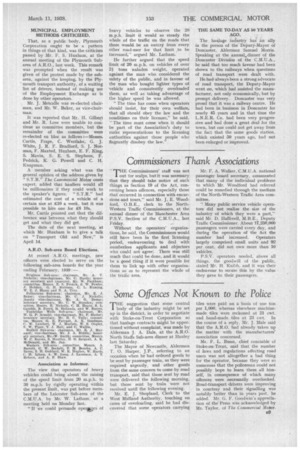Commissioners Thank Associations
Page 43

If you've noticed an error in this article please click here to report it so we can fix it.
•• HE Commissioners' staff was not
out for scalps, but it was necessary that they should take notice of such things as Section 19 of the Act, concerning hours offences, especially those that occurred in connection with excursions and tours," said Mr. J. E. Woodford, 0.B.E., clerk to the NorthWestern Traffic Commissioners, at the annual dinner of the Manchester Area P.S.V. Section of the C.M.U.A., last Friday.
Without the operators' organizations, he said, the Commissioners would still have been in the first licensing period, endeavouring to deal with numberless applicants and objectors who could not agree: There was still much that could be done, and it would be a good thing if it were possible for them to link up with other organizations so as to represent the whole of the traffic area. Mr. F. A. Walker, C.M.U.A. national passenger board secretary, commented that many of the individual problems to which Mr. Woodford had referred could he remedied through the medium of the North-Western Traffic Area committee.
" Many public service vehicle operators did not realize the size of the industry of which they were a part," said Mr. D. Halliwell, M.B.E.. Deputy Traffic Commissioner. About 17,250,000 passengers were carried every day, and during the operation of the Act the number had increased. Operators largely comprised small units and 92 per cent, did not own more than 10 vehicles.
P.S.V. operators needed, above all thiugs, the goodwill of the public, stated Mr. H. Kuihh, and it was their endeavour to secure this by the value they gave to their passengers.
















































































